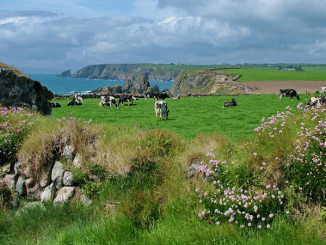
How has Ireland used the flexibility of the CAP legal framework post-2022 to design a fairer CAP Strategic Plan? A new policy analysis, researched and written by Matteo Metta for the Left group in the European Parliament (GUE), assesses fairness in Ireland’s CAP submission in a number of ways, while making a proposal for a way forward to assess CAP spending with more coherence – a unique beneficiary code for all CAP recipients.
Ireland’s draft CAP Strategic Plan: fairer, or still unfair first assesses fairness as a concept – how do we understand it within the CAP and agri-food, rural and policy framework? What role for equity, for farmers/land owners, agri-food sectors, and supply chain actors? Metta then goes on to consider the following key areas when trying to understand fairness: internal convergence, capping, young farmer payment, small farmer scheme, social conditionality, producer organisations and gender.
A green, amber and red (traffic light) scoring system is used to aid understanding of the performance of the draft Irish CAP Strategic Plan.
Along with these considerations, Metta has specific things to say about the definition of active farmers, some observations on the green side of Ireland’s CAP plan, and, finally, makes a proposal for what he calls a “unique beneficiary code to track and visualise the sum of all CAP support received by each farmer”.
Below we have excerpted the conclusion and recommendations from the report. We are also making it available to download, exclusively here first on ARC2020.
Read/Download – Ireland’s draft CAP Strategic Plan_fairer or still unfair_Jan 2022
(Note – This policy analysis is based on Ireland’s draft CAP Strategic Plan 2023-2027 published here on the 8th Nov 2021 and the second modelling analysis presented in August 2021 by the Irish Department of Agriculture, Food and the Marine (DAFM) after various requests for revisions advanced here by the think tank organisation Agriculture and Rural Convention (ARC2020) and here by the Irish Natura and Hill Farmers Association (INHFA). At the time of developing this report (Dec 2021), Ireland’s draft CAP Strategic Plan was still subject to the last days of stakeholder consultation. The draft received Cabinet approval on 21 December 2021 to submit the plan to the European Commission by 01 January 2022. The plan will be approved within six months of appraisal and negotiations between the European Commission and the Irish DAFM. Therefore, the analysed draft can be subject to updates. )
Conclusions and Recommendations
This study examined Ireland’s draft CAP Strategic Plan 2023-2027 published on the 8th November 2021. It aimed to shed light on the flexibility granted by the CAP legislation to design fairer and green CAP Strategic Plans. The new three CAP legislations voted in Nov 2021 by the European Parliament are equally important, but more attention was paid on the flexibility offered by CAP Strategic Plan Regulation.
Overall, the study found that Ireland’s draft CAP plan made some steps forward compared to the current programming period 2014-2020. For instance, the internal convergence rate will be increased from 60% to 85%, thus ensuring a more equal distribution of BISS entitlements across the Irish territory. The max unit amount will decrease from 700 to 320 euro/ha. A higher share of the national ceiling for direct payments will be allocated to young farmers. 10% of direct payments will be allocated to redistributive payment towards the first 30 hectares of every farm. A cap will be introduced to farmers receiving more than 66000 Euro, although it is still unclear if the deduction of labour costs will be allowed.
However, compared to the flexibility granted by the EU legislation, Ireland shows with minimal ambition. For instance, Ireland could have proposed a full internal convergence rate at 100%; explored higher scenarios for redistributive payments (e.g. 12%, 15%); designed and implemented an ambitious small farmer scheme; implemented social conditionality as of the 2023 programming period; or revised the criteria to recognise producer organisations under sectorial support. More observations are made in each section of this report.
Some recommendations for the European Commission, Ireland’s decision makers, and policy analysts involved in the final design, appraisal and approval of Ireland’s draft Plan:
- Complete the draft CAP SP with its mandatory ex-ante evaluation (Article 139 of the CAP SP regulation) and critically study the results bringing evidences on the quantitative and qualitative implications of each policy decisions (Table 1, fairness elements) made towards reversing unfair distribution of CAP agricultural subsidies and meeting structural inequities in agri-food system and rural areas. With this supporting material, national and European negotiators are expected to be effectively responsive to the findings, opinions, and recommendations offered by the Strategic Environmental Assessment and the Ex-ante evaluation – the latter is still missing in the annexes to the draft.
- Examine how Ireland’s draft CAP plan meet the flexibility in other areas of the CAP legislations (e.g. Common Market Organisation), for instance on the quality schemes and any other initiatives aimed at increasing the added value captured by the farmers along the supply chain.
- Examine the extent to which Ireland’s draft CAP plan meet the recommendations sent in December 2020 by the European Commission in the framework of the structured dialogue with the EU countries to guarantee that the new CAP strategic plans fully support the transition foreseen in the Green Deal and are aligned to the targets.
Finally, it is recommended that the DAFM work with the Paying Agency and other stakeholders on the creation of a unique beneficiary code to track and visualise maps on the distribution of CAP resources among the various recipients and across the Irish territory.
More on CAP
ARC Launches New Report on CAP as Member States Submit Strategic Plans
National Coalitions Urge Commission to Assess CAP Plans with Ambition
MEPs have a final plenary CAP vote this week – what’s at stake?
CAP Beyond the EU | Precision Agriculture: For Whom Precisely?
Should Agricultural Subsidies Go To Labour Not Land? | New Report
Slashing Space for Nature? Ireland Backsliding on CAP basics
Quality Schemes – Who Benefits? Central America, Coffee and the EU






3 Trackbacks / Pingbacks
Comments are closed.